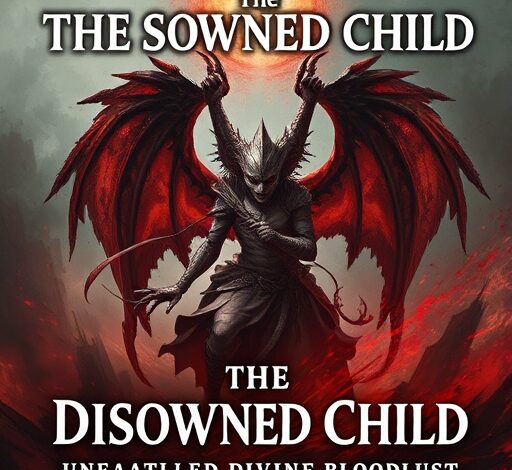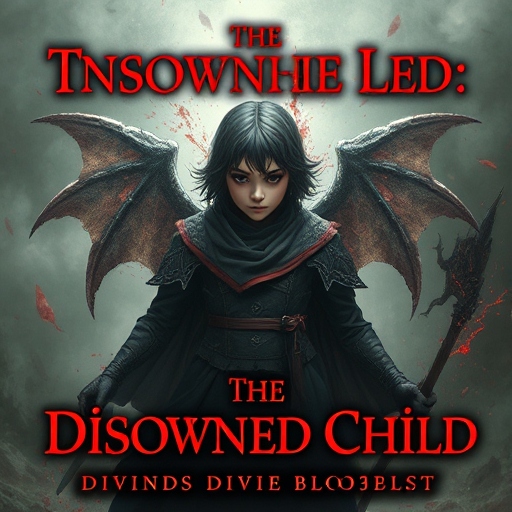The Disowned Child: Chronicles of Unleashed Divine Bloodlust

Introduction: A Tale of Rejection and Wrath
In the mythos of countless people, the story of the disowned child is one that vibrates deeply. It is a story woven with emotions ranging from disloyalty and desertion to rage and final revenge. But what happens when this child is not simply cast away from their family, but from the very kingdoms of religion itself? This article boards on a journey into a world where heavenly descents, cosmic forces, and antique curses cross. The story of the rejected child is one that exceeds the human condition, speaking to an original fury that oils the very cloth of life itself.
From ancient legends to modern explanations, the figure of the disowned child has been the subject of many stories, often showing a complex relationship between family dynamics and a higher sense of cosmic justice. What drives a child, cast away by both earthly and heavenly figures, to unleash a hatred so scary that it looms to weaken the very order of the universe? The question, though ancient, is as relevant today as ever.
In this history, we research into the symbolic and accurate meaning of being the disowned child—an individual. Who conveys the load of divine blood, yet is rejected by the gods. As we explore the theme of “unleashed divine bloodlust,” we will see how such rejection leads to a transformation so deep that it challenges the very concept of creation, morality, and purpose.
The Divine Paradox: Birth of the Unwanted
The very essence of being “disowned” suggests a sense of desertion, a rejection of love or belonging. But in the context of heavenly origins, being disclaimed becomes an inconsistency. For this child is not the creation of ordinary human parents, but a being born of spiritual or heavenly origins. Their blood runs through their veins with the power of the gods themselves, and yet, they are wild, often in the most ruthless of ways.
In most mythologies, divine objects consider children with huge power, yet there is often a fear of their potential. The child of a god is seen as a double-edged sword. One who could either serve as a powerful friend or a possible danger. When divine blood mixes with human weakness, the outcome can be random. The gods, therefore, often find themselves forced to make decisions that might seem painful or heartless to mortal minds—decisions that may involve moulding sideways a child they deem too dangerous, too wild, or too uncontrollable.
The most famous examples of the disowned child in mythology often involve a figure who is wild at birth or rejected by their divine parents. One of the most well-known examples is the story of Hephaestus, the Greek god of skill and fire. Born with an irregularity, Hephaestus was thrown from Olympus by his mother, Hera, in a fit of disgust. As a baby, he was wild on an island, left to fend for himself. His rejection by his mother—and later by Zeus—was not just an act of unkindness. But a reflection of how the gods themselves feared the power that Hephaestus could one day exercise.
Another story that comes to mind is that of Loki, the Norse god who, despite being blood brothers with Odin, was finally company out due to his wild and dangerous nature. The disownment of Loki was not just a personal rejection. It was symbolic of the gods’ incapability to control the confusion that Loki represented. He became the very example of a heavenly heritage gone amiss.

The Seed of Bloodlust: Anger Transmuted into Power
Leaving types anger. The spirits may believe they can wildness their children without importance. But in reality, these rejected lives often become far more dangerous than estimated. The revenge that rises from being rejected is not simply the fury of a rejected child. It is the volatile energy of a being who has inborn the divine power of the gods, yet has been poor of the divine protection and love that should accompany it.
Once rejected, the child often boards on a journey of self-discovery and permission. In these stories, the disowned child must struggle against a world that both fears and rejects them. They are company floating in the mortal realm, often facing huge challenges. But over time, they begin to connect the very blood that was once their curse.
This process of permission often involves two stages: anger and revenge. The disowned child is originally filled with the fury of desertion, but over time. They learn to channel this anger into power. The gods, who once rejected them, are often fixed off guard by the immense strength that their former child can summon.
In the case of Kali, the Hindu idol, her disownment and rejection by her father, King Daksha, ran to a violent charge. Kali’s anger was not only a physical appearance of her anger. But also a symbol for the power that divine blood could unlock when it was quiet. Her dance of destruction—her hatred—was a appearance of a cosmic force that could not be deprived of.
Similarly, the story of Hercules—though not exactly the same as the others—is another example of a disclaimed divine child whose hatred grows out of rejection. Born of Zeus and a mortal woman, Hercules was forced to endure the anger of Hera. Zeus’s wife, who saw him as a constant reminder of her husband’s falseness. The resultant series of trials that Hercules had to endure not only made him one of the greatest heroes in Greek tradition but also fake his cruelty into a force capable of reshaping the world.
The Battle for Control: Chaos vs. Order
As the disowned child grows in strength, the question becomes not whether they will exact revenge but how they will do so. For some, the release of their revenge becomes a battle for control. An internal struggle between the confusion within and the order that society demands. These children, born of heavenly heritage, are often faced with the prospect of destroying the very thing that created them: the gods and the cosmic order.
The disclaimed child is a creature of division—half divine, half mortal—and this struggle between their characteristic divine nature and their mortal, human side is often the substance for battle. The gods may have wild them, but they are still filled with divine power, and the attraction to use that power to control or destroy is ever-present.
Take the example of Anakin Skywalker, the central figure in the Star Wars saga. Although not from mythology, Anakin’s journey mirrors that of many epic heroes. Born of mysterious origins, he was meant for greatness, yet rejected by the Jedi Order. His ultimate fall to the dark side of the Force can be seen as an appearance of the unchecked cruelty of a disclaimed child. A force of power and potential turned secret, leading to destruction and confusion.
Rejection of Destiny: The Fall of the Gods
In many of these stories, the disowned child does not simply become a force of revenge. But a symbol of the very thing the gods fear: a power that can escape their control. When a divine child is cast out, it is often because the gods themselves fear what they might become. This fear is rooted in the understanding that divine blood, left unchecked, can lead to the weakening of the cosmic order.
As the child grows and unchecks their cruelty. They often become an existential danger to the gods who once sought to control them. In some cases, the gods may attempt to repeat control, but it is too late. The disowned child has grown too powerful, too independent, and too dangerous to be contained.
One such example is the story of Prometheus, the Titan who challenged Zeus to bring fire to humanity. In his non-compliance, Prometheus not only challenged the gods’ authority. But also symbolized the potential of divine blood unchecked upon the mortal realm. Prometheus’s actions run to a series of events that ultimately shook the very foundation of the gods’ rule. His rising marked the beginning of the fall of the gods and the rise of humanity’s independence.
Conclusion: The Price of Rejection
The tale of the disowned child and their ultimate unchecking of divine inhumanity is not just a tale of revenge. It is a reflection of the consequences of fear, rejection, and control. These stories speak to the very nature of power and how it must be managed with care, especially when dealing with beings of immense strength and potential. Rejection may seem like a solution, but it often serves only to fuel the creation of something far more dangerous.
Ultimately, the story of the disowned child is a sad one. It speaks to the idea that, in rejecting the divine, we may carelessly give birth to a power so great that it can never be uncompleted. The unleashed bloodlust is not just a weapon. It is a force of nature, a reminder that even the gods must contend with the consequences of their actions.
Get in touch to get more updates Movieda2023! Thank you
